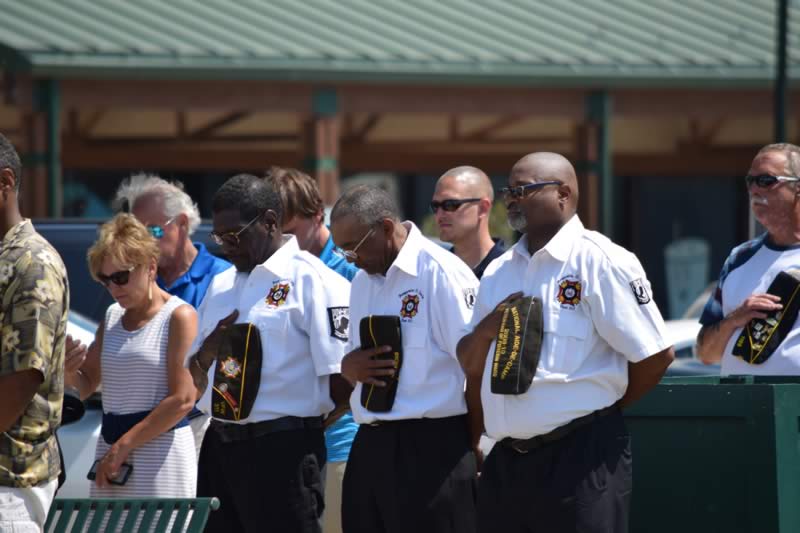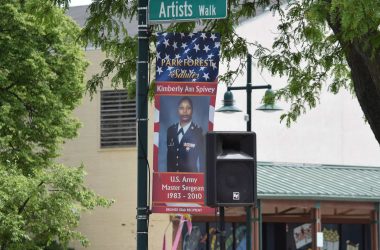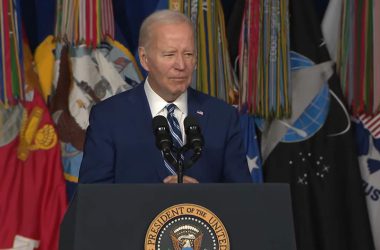Washington, D.C.–(ENEWSPF)–May 28, 2012 – 2:27 P.M. EDT
THE PRESIDENT: Good afternoon, everybody. Chuck, thank you for your words and your friendship and your life of service. Veterans of the Vietnam War, families, friends, distinguished guests. I know it is hot. (Laughter.) But you are here — to honor your loved ones. And Michelle and I could not be more honored to be here with you.
It speaks to the complexity of America’s time in Vietnam that, even now, historians cannot agree on precisely when the war began. American advisors had served there, and died there, as early as the mid-’50s. Major combat operations would not begin until the mid-’60s. But if any year in between illustrated the changing nature of our involvement, it was 1962.
It was January, in Saigon. Our Army pilots strapped on their helmets and boarded their helicopters. They lifted off, raced over treetops carrying South Vietnamese troops. It was a single raid against an enemy stronghold just a few miles into the jungle — but it was one of America’s first major operations in that faraway land.
Fifty years later, we come to this wall — to this sacred place — to remember. We can step towards its granite wall and reach out, touch a name. Today is Memorial Day, when we recall all those who gave everything in the darkness of war so we could stand here in the glory of spring. And today begins the 50th commemoration of our war in Vietnam. We honor each of those names etched in stone — 58,282 American patriots. We salute all who served with them. And we stand with the families who love them still.
For years you’ve come here, to be with them once more. And in the simple things you’ve left behind — your offerings, your mementos, your gifts — we get a glimpse of the lives they led. The blanket that covered him as a baby. The baseball bat he swung as a boy. A wedding ring. The photo of the grandchild he never met. The boots he wore, still caked in mud. The medals she earned, still shining. And, of course, some of the things left here have special meaning, known only to the veterans — a can of beer; a packet of M&Ms; a container of Spam; an old field ration — still good, still awful. (Laughter.)
It’s here we feel the depth of your sacrifice. And here we see a piece of our larger American story. Our Founders — in their genius — gave us a task. They set out to make a more perfect union. And so it falls to every generation to carry on that work. To keep moving forward. To overcome a sometimes painful past. To keep striving for our ideals.
And one of the most painful chapters in our history was Vietnam — most particularly, how we treated our troops who served there. You were often blamed for a war you didn’t start, when you should have been commended for serving your country with valor. (Applause.) You were sometimes blamed for misdeeds of a few, when the honorable service of the many should have been praised. You came home and sometimes were denigrated, when you should have been celebrated. It was a national shame, a disgrace that should have never happened. And that’s why here today we resolve that it will not happen again. (Applause.)
And so a central part of this 50th anniversary will be to tell your story as it should have been told all along. It’s another chance to set the record straight. That’s one more way we keep perfecting our Union — setting the record straight. And it starts today. Because history will honor your service, and your names will join a story of service that stretches back two centuries.
Let us tell the story of a generation of servicemembers — every color, every creed, rich, poor, officer and enlisted — who served with just as much patriotism and honor as any before you. Let’s never forget that most of those who served in Vietnam did so by choice. So many of you volunteered. Your country was at war, and you said, “send me.” That includes our women in Vietnam — every one of you a volunteer. (Applause.) Those who were drafted, they, too, went and carried their burden — you served; you did your duty.
You persevered though some of the most brutal conditions ever faced by Americans in war. The suffocating heat. The drenching monsoon rains. An enemy that could come out of nowhere and vanish just as quickly. Some of the most intense urban combat in history, and battles for a single hill that could rage for weeks. Let it be said — in those hellholes like Briarpatch, and the Zoo and the Hanoi Hilton — our Vietnam POWs didn’t simply endure; you wrote one of the most extraordinary stories of bravery and integrity in the annals of military history. (Applause.)
As a nation, we’ve long celebrated the courage of our forces at Normandy and Iwo Jima, the Pusan Perimeter and Heartbreak Ridge. So let us also speak of your courage — at Hue and Khe Sanh, at Tan Son Nhut and Saigon, from Hamburger Hill to Rolling Thunder. All too often it’s forgotten that you, our troops in Vietnam, won every major battle you fought in. (Applause.)
When you came home, I know many of you put your medals away — tucked them in a drawer, or in a box in the closet. You went on with your lives — started families and pursued careers. A lot of you didn’t talk too much about your service. As a consequence, this nation has not always fully appreciated the chapter of your lives that came next.
So let us also tell a story of a generation that came home, and how — even though some Americans turned their back on you — you never turned your back on America. (Applause.) Like generations before you, you took off the uniform, but you never stopped serving. You became teachers and police officers and nurses — the folks we count on every single day. You became entrepreneurs, running companies and pioneering industries that changed the world. You became leaders and public servants, from town halls to Capitol Hill — lifting up our communities, our states, our nation.
You reminded us what it was like to serve, what it meant to serve. Those of you who stayed in uniform, you rose through the ranks, became leaders in every service, learned from your experience in Vietnam and rebuilt our military into the finest force that the world has ever known. (Applause.) And let’s remember all those Vietnam veterans who came back and served again — in the wars in Iraq and Afghanistan. You did not stop serving. (Applause.)
Even as you succeeded in all these endeavors, you did something more — maybe the most important thing you did — you looked after each other. When your government didn’t live up to its responsibilities, you spoke out — fighting for the care and benefits you had earned, and, over time, transforming the VA. And, of course, one of these Vietnam veterans is now our outstanding Secretary of Veterans Affairs, Ric Shinseki. (Applause.)
You looked after one another. You cared for one another. People weren’t always talking about PTSD at the time — you understood it, and you were there for each other. Just as importantly, you didn’t just take care of your own, you cared for those that followed. You’ve made it your mission to make sure today’s troops get the respect and support that all too often you did not receive. (Applause.)
Because of you, because our Vietnam veterans led the charge, the Post-9/11 GI Bill is helping hundreds of thousands of today’s veterans go to college and pursue their dreams. (Applause.) Because of you, because you didn’t let us forget, at our airports, our returning troops get off the airplane and you are there to shake their hands. (Applause.) Because of you, across America, communities have welcomed home our forces from Iraq. And when our troops return from Afghanistan, America will give this entire 9/11 Generation the welcome home they deserve. That happened in part because of you. (Applause.)
This is the story of our Vietnam servicemembers — the story that needs to be told. This is what this 50th anniversary is all about. It’s another opportunity to say to our Vietnam veterans what we should have been saying from the beginning: You did your job. You served with honor. You made us proud. You came home and you helped build the America that we love and that we cherish.
So here today, it must be said — you have earned your place among the greatest generations. At this time, I would ask all our Vietnam veterans, those of you who can stand, to please stand, all those already standing, raise your hands — as we say those simple words which always greet our troops when they come home from here on out: Welcome home. (Applause.) Welcome home. Welcome home. Welcome home. Thank you. We appreciate you. Welcome home. (Applause.)
Today, we’re calling on all Americans, and every segment of our society, to join this effort. Everybody can do something. Five decades removed from a time of division among Americans, this anniversary can remind us of what we share as Americans. That includes honoring our Vietnam veterans by never forgetting the lessons of that war.
So let us resolve that when America sends our sons and daughters into harm’s way, we will always give them a clear mission; we will always give them a sound strategy; we will give them the equipment they need to get the job done. We will have their backs. (Applause.) We will resolve that leaders will be candid about the risks and about progress — and have a plan to bring our troops home, with honor.
Let us resolve to never forget the costs of war, including the terrible loss of innocent civilians — not just in Vietnam, but in all wars. For we know that while your sacrifice and service is the very definition of glory, war itself is not glorious. We hate war. When we fight, we do so to protect ourselves because it’s necessary.
Let’s resolve that in our democracy we can debate and disagree — even in a time of war. But let us never use patriotism as a political sword. Patriots can support a war; patriots can oppose a war. And whatever our view, let us always stand united in support of our troops, who we placed in harm’s way. (Applause.) That is our solemn obligation. (Applause.)
Let’s resolve to take care of our veterans as well as they’ve taken care of us — not just talk, but actions. Not just in the first five years after a war, but the first five decades. For our Vietnam veterans, this means the disability benefits for diseases connected to Agent Orange. It means job opportunities and mental health care to help you stand tall again. It means ending the tragedy of veterans’ homelessness, so that every veteran who has fought for America has a home in America. You shouldn’t have to fight for a roof over your heads when you fought on behalf of the country that you love. (Applause.)
And when an American does not come back — including the 1,666 Americans still missing from the Vietnam War — let us resolve to do everything in our power to bring them home. This is our solemn promise to mothers like Sarah Shay who joins us today, 93 years old, who has honored her son, Major Donald Shay, Jr., missing in action for 42 years. There she is. Sarah, thank you for your courage. God bless you. (Applause.)
This is the promise we’re fulfilling today to the Meroney family of Fayetteville, Arkansas. Forty-three years after he went missing, we can announce that Army Captain Virgil Meroney, III, is coming home, and he will finally rest in peace. (Applause.)
Some have called this war era a scar on our country, but here’s what I say. As any wound heals, the tissue around it becomes tougher, becomes stronger than before. And in this sense, finally, we might begin to see the true legacy of Vietnam. Because of Vietnam and our veterans, we now use American power smarter, we honor our military more, we take care of our veterans better. Because of the hard lessons of Vietnam, because of you, America is even stronger than before. (Applause.)
And finally, on this anniversary and all the years to come, let us remember what binds us, as one people. This is important for all of us, whether you fought in the Vietnam War or fought against it, whether you were too young to be shaped by it. It is important that our children understand the sacrifices that were made by your troops in Vietnam; that for them, this is more than just a name in history books. It’s important that we know the lesson of a gift once left at this Memorial.
It was towards the end of the day, and most of the tourists and visitors had departed. And there it was — a football helmet, black with white stripes, and a wristband. And with them was a handwritten note. And it was from a young man, still in high school. And mind you, this was more than two decades after Vietnam. That high school student was born years after the war had already ended. But in that short, handwritten note he captured the reverence — the bonds between generations — that bring us here today.
The letter began, “Dear Vietnam Veterans, here are two things from me to you that I think you should have.” He explained that it was his helmet from midget football and his wristband from his senior year. So today I want to close with the words he wrote:
In these two pieces of equipment, I was allowed to make mistakes, correct them, grow and mature as a person. However, that was on my battlefield. You didn’t get the chance to do that on your battlefield. Some of you were forced to grow up too fast; all of you died too soon. We do have many things in common, though. We both have pride, heart and determination. I’m just sorry you guys had to learn those qualities too fast. That is why I’m giving you what I grew up with. You are true heroes and you will never be forgotten.
That’s from a high school kid, born decades after the end of the war. And that captures the spirit that this entire country should embrace.
Veterans, families of the Vietnam War, I know the wounds of war are slow to heal. You know that better than most. But today we take another step. The task of telling your story continues. The work of perfecting our Union goes on. And decades from now, I hope another young American will visit this place and reach out and touch a name. And she’ll learn the story of servicemembers — people she never met, who fought a war she never knew — and in that moment of understanding and of gratitude and of grace, your legacy will endure. For you are all true heroes and you will all be remembered.
May God bless you. May God bless your families. May God bless our men and women in uniform. And may God bless these United States of America. (Applause.)
END
2:50 P.M. EDT
Source: whiehouse.gov








